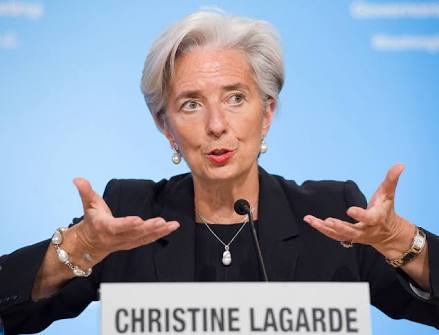When IMF visits, tears follow, By Owei Lakemfa
Articles/Opinion, Featured, Latest Headlines Tuesday, January 12th, 2016
BALTIMORE, MD (AFRICAN EXAMINER) – International Monetary Fund (IMF) Managing Director, Madam Christine Lagarde was on a four-day visit to Nigeria from January 4. She claimed it was a friendly visit: “I’m not in Nigeria to negotiate for IMF loans but to promote fiscal discipline and favourable monetary policies”
Making the visit look like some holiday for herself, and husband, Monsieur Xavier Giocanti, she even visited the Mother Theresa Children Home, Abuja where on behalf of the IMF she donated a hefty sum of $7,500 to demonstrate that “We at the IMF, we care about the youths, poor and about those who are left at the side of the road.”
But those familiar with the IMF know that the expressed love for Nigeria, the youths, the poor and the orphaned, are side shows to make the visit look like some long lost aunt visiting her loved ones. The last time Hurricane Largarde made a landfall in Nigeria four years ago, it was so devastating that amongst other things, the whirlwind tossed petrol (PMS) price from N65 to N140 setting off serious social crises. The attempts to clear the hurricane debris took years, and the negative effects are still felt today. Some unique characteristics of IMF hurricanes are that their effects are not immediately visible and their after-effects are quite devastating. It is like cleaning up a nuclear accident site.
For example, the IMF in September 1986, lured the Babangida regime to adopt a nebulous Second-Tier Foreign Exchange Market (SFEM) By the time the IMF was through with us under that regime, the currency which was about 90 kobo to the dollar went up to N18.
Like a colonial headmistress visiting primary school pupils, she rubbed our heads saying Nigeria is doing great to improve the business environment. She then launched into platitudes: “poverty and inequality remain high” “Nigerians should brace up for harder times” “reduce leakages” “Hard decisions must be made”
It is in the DNA of the IMF to tell you what you already know, and only what it wants you to know. It is like a person admonishing a hunchback to straighten up and walk like other people as if that is not the wish and prayer of the hunchback.
Generally, the mentality of the IMF is to tax and further impoverish citizens of pliant countries either directly through its so-called CONDITIONALITIES or in more subtle ways like friendly visits; whatever the method, the objectives are the same. As the IMF has done for about four decades now, Largarde told us last week “Subsidies are no longer good” But we all should know that is a lie; if subsidies are good for Europeans, who in addition, have all sorts of safety net and good infrastructure, why should they be bad for Africans?
The IMF is the preserve of Europe like the World Bank is that of the United States; if subsidies are bad, should Europe not stop them first before asking under developed countries to discard them? The Europe Union (EU) has a huge regime of subsidies under its European Grants and Subsidies programme. A component part of that subsidy system is its Common Agricultural Policy (CAP) under which the EU gives an annual E60 Billion subsidy to European farmers. This is still captured in the current EU 2014-2020 Budget.
Largarde, like her predecessor, Dominique Strauss- Khan, is French. The French maintain huge subsidies for agriculture and small scale businesses which it calls “incentives” There is a current dispute between the EU and fifteen European countries including France over the utilization of agriculture subsidies. From the EU funds alone, France had paid its farmers E3.5 billion subsidies while the EU argues that only E2.4 Billion subsidies were properly processed. But the French Agriculture Minister, Stephane Le Foll has assured French farmers that they would not need to reimburse the balance E1.1 Billion as the government will bear the costs. So if Largarde and her fellow French enjoy generous subsidies, why would she tell Nigerians that subsidies are harmful?
Of course, she told us to have a “Flexible Monetary Policy” To the uncritical, Largarde might be implying the so-called “flexible” policy the IMF has forced Nigeria to run for thirty years now. But she is actually telling us to further devalue our currency. Of course she asked Nigeria to increase Value-Added-Tax (VAT). In an import-dependent country, to increase VAT is to push inflation higher. It will also lead to mass job losses because machinery and lots of raw materials are imported. As expected, the IMF chief wants us to “broaden the tax base” which comes down to imposing more taxes on the populace especially workers.
The refrain of the IMF for decades now is the removal of so-called fuel subsidy. On this, she repeated the decades old IMF trite about subsidy injuring the poor, and the need to free funds for other projects. But our experience in Nigeria is that increases in prices of petroleum products have led to further impoverishment; costs of transportation, food, housing, education and goods rise, our generator-dependent economy runs into more trouble and jobs are lost. With the currency devaluation championed by the IMF, we will continue to need more and more naira for imported fuel which is the primary cause of subsidy. Has anybody ever wondered why the IMF is always pressuring Nigeria to remove subsidy on imported fuel rather than pressure it as an oil-producing country to locally refine petroleum products?
Nigeria over rates the IMF; allowing its officials to meet our leaders at the highest levels rather than assigning the Central Bank Governor as the highest possible officer a Lagarde can meet. The IMF is an unimaginative institution that makes the same analysis and prognosis decade after decade. It is like a fake doctor who diagnose the same ailment for all patients and administers the same expired drugs to all patients irrespective of disease. It takes fundamental and far reaching decisions for underdeveloped countries without taking any responsibility. The IMF is essentially, an undertaker; when it visits a country, the state of the populace, takes a turn for the worse.
Related Posts
Short URL: https://www.africanexaminer.com/?p=29346






















